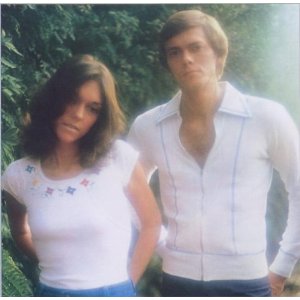This makes a good deal of sense.
As things turned out, a typical fan would have bought "Please Mr. Postman" in late 74 and "Only Yesterday" in early 75. That would have also given access to the b-side album track "Happy." As the album was finally being released, "Solitaire" became a single and had as its b-side "Love Me For What I Am". That meant that if you bought the singles, you already had basically more than half of the album - and these singles were all in stereo.
All that's left on the "new" album are the "Aurora"/"Eventide" bookends. Sublime yes, but essentially one song. Then there's "Desperado", a re-do of an Eagles song that's a bit slow and plodding; "I Can Dream Can't I?", a dreamy salute to the big band era; and "(I'm Caught Between) Goodbye And I Love You", a nice but inconsequential album track. In the cash-strapped '70s, I can see why a fan might not have grabbed HORIZON right away, but maybe waited until later, thus keeping the album a little lower in the charts.
Harry
I see your point about a few of the Horizon tracks having already appeared on the singles that preceded its release, but that would only have been an issue for the fans who bought all of them - and those are exactly the ones who probably wouldn't have held off buying the album at all (or only for a little while). The strange issue with Horizon seems to be that a significant number of people who'd bought their earlier albums, whether fans or (more likely) casual buyers, didn't just wait to purchase it, they never purchased it, hence its rather lower sales figures in the US and shorter run on the charts. Yet other albums were still doing brisk business at the same time, so it wasn't like the whole market was depressed. It's easy to understand the weaker sales performance of A Kind of Hush because, by and large, the album's not up to snuff quality-wise, but Horizon was a mostly solid effort - even some of the critics at the time thought so.

